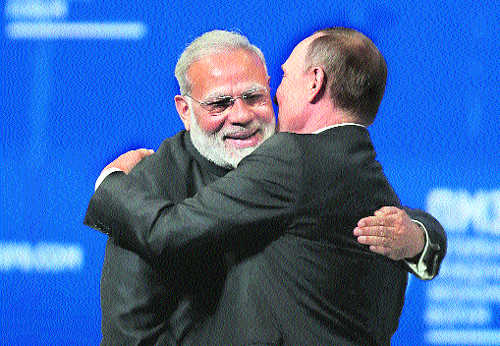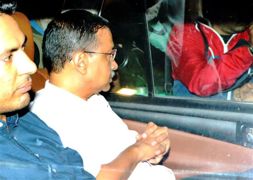
Comfort zone: India’s time-tested friendship with Russia must be preserved.
MK Bhadrakumar
THE recent events in regional politics form a stunning backdrop to PM Modi’s US visit. The post-Cold War world is falling apart and it brings to mind the adage that while it might be possible to put together the pieces that came away, things can never be the same again. Fault lines have appeared on templates of the US’ global strategy, raising scepticism about the resilience of India’s ‘defining partnership’ with that country.
These templates relate to the US’ tense ties with Russia, its retrenchment in the Asia-Pacific and its policy drift in West Asia and Afghanistan. All three impact India’s core interests. The downhill trajectory of US-Russia ties is self-evident: Russia acquiring the ‘enemy image’ in Pentagon’s 2018 defence budget; US Senate bill imposing more sanctions against Russia; NATO continuing with provocative deployments on Russia’s borders (and Moscow announcing intention to create 20 military bases on the western front by yearend); shooting down of Syrian warplane by the US (Moscow retaliating by suspending the Russian-American ‘de-confliction’ mechanism in Syria); Moscow cancelling foreign ministry-level talks scheduled for June 23 and so on.
The Russian defence ministry disclosed on Friday that its jets scrambled 14 times in the past week to intercept spy planes from NATO countries (bulk of them being the US’ RC-135 jets and RQ-4B Global Hawk drones), which approached Russian borders 10 times. On Thursday, a Russian Tu-154 VIP aircraft carrying defence minister Sergei Shoigu was intercepted in the Baltic as it was approaching Kaliningrad by an F-16 Viper warplane, which was forced to retreat after an Su-27 Flanker jet zoomed in and displayed its weapons. In Syria, the US military is challenging the government’s operations to regain control of the border with Iraq, and last week transferred from Jordan to Syria a missile system with a 300-km range.
There is intense media speculation that the US and Russia could be sliding toward military confrontation. Yet, it was only recently that Modi described Russia as India’s ‘natural ally’. To be sure, we need to brush up our ancient Indian rope trick to make sure that our ‘defining partnership’ with the US doesn’t undermine our time-tested friendship with Russia.
Equally, the scope of the ‘defining partnership’ is dramatically shrinking in the Asia-Pacific, where Washington has jettisoned its pivot strategy. Ironically, on the eve of Modi’s US visit, Washington hosted the first session of the ‘2+2’ format (foreign and defence ministers) with China on June 21 under the new rubric of Diplomatic and Security Dialogue. The joint press briefing by Secretary of State Rex Tillerson and Defence Secretary James Mattis on Wednesday signalled that the US intends to go full steam ahead on China, guided by a 40-year road map. The highlights were: a) continued US reliance on China to handle North Korea problem; b) mutual desire to put behind the acrimonious discords (Mattis prefers to use the word ‘disconnects’) over South China Sea; c) ‘closer coordination’ in the fight against terrorism; d) US request to China for help in Iraq ‘to ensure the country’s long-term stability and growth’; and e) significantly, commencement of talks involving civilian and military teams ‘in new areas of strategic concern like space, cyberspace, nuclear forces, and non-proliferation issues’, where, as Tillerson put it, ‘We (US) need to enhance stability and develop strong international standards…and we need China to play a major role.’
Without doubt, the US does not envisage India as a counterweight to China. Which means that a host of Indian assumptions that have provided underpinning for our China policies and vis-à-vis Asia-Pacific region, are coming unstuck. India is caught between a rock and a hard embrace. The changing strategic orientations between the US and China will see greater inclination on China’s part to apply pressure on India to achieve its interests. The stark choice is between ‘Finlandisation’ in the face of Chinese regional primacy or creating an enhanced base for even-handedly handling with China the key aspects of regional affairs. The power dynamics in Asia compels India to rework its ‘Act East’ and Indian Ocean policies.
When it comes to West Asia and Afghanistan, Washington lacks a coherent regional strategy. At times, the IS and the US seem like ‘frenemies’ on the ground. The two-week standoff between Saudi Arabia and Qatar has badly exposed the US as an ineffectual hegemon fluttering its wings in the void in vain. On Tuesday, the US State Department came out with an extraordinary statement censuring the Saudi stance against Qatar and alluding to Saudi involvement in terrorism (‘whether it’s through terror financing or other means’). Saudi Arabia hit back with a charter of 13 harsh demands against Qatar. The US’ credibility has hit rock bottom.
In Afghanistan, the US has pretty much exhausted its strategic options. ‘Surge’ was tried and given up and the experimentation with Richard Nixon’s ‘Vietnamisation’ strategy — using American advisers and air power to develop and support local military capability — led nowhere. Defence Secretary Mattis openly admits that the Taliban is winning the war. The Pentagon’s proposed ‘mini-surge’ can neither break the Taliban insurgency nor create conditions for a matching civilian surge to root out corruption, ensure good governance or launch an Afghan reconstruction. Meanwhile, heavy-handed US military presence incites Islamist terrorism.
The India-US ‘defining partnership’ has become a contradiction in India’s Eurasian integration processes, irrelevant to the Asia-Pacific regional scenario, and a liability in India’s extended neighbourhood of West Asia. What is its contribution to the world order? It is about time we think of a reset that will make the partnership useful for India’s modernisation and transformation, which was how Narasimha Rao had envisioned it. But then, it must go hand in hand with a vision to reform India as well, which was the case in the early and mid-nineties.
This is where the intellectual bankruptcy of the present government lies. India’s development agenda ought to have been at the very core of the relationship with the US. Arms deals cannot be its leitmotif. Beijing is showing how with creative thinking it is possible to leverage the ties with the US, no matter the transition in Washington. India is far better placed than to do that, given the bipartisan support for our country in the American opinion. The Modi government must co-relate the defining partnership with the critical needs of India’s transformation as a middle income economy.
The writer is a former ambassador



























